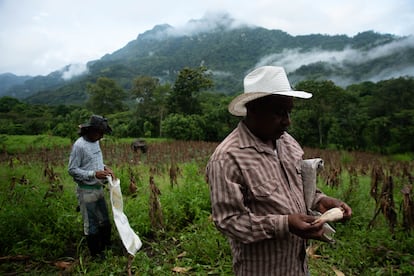Mexico’s ban on genetically modified corn creates new trade friction with US
Citing the enormous impact on American farmers, the Biden administration says it may enforce compliance with North American trade agreements


The US and Mexican governments are feverishly engaged in trade negotiations to avoid a corn war. President Andrés Manuel López Obrador’s (AMLO) ban on genetically modified grain has put the agricultural sectors of both countries on the defensive. There are fears of drastic increases in production costs, and the US is threatening to invoke the tripartite United States-Mexico-Canada Agreement (USMCA). While AMLO has signaled that he may be willing to soften the ban to avoid negative impacts on multimillion dollar US imports, Mexican environmentalists opposed to agrochemicals and genetically modified organisms (GMO) are calling for their government to resist US pressure.
Mexico is the world’s largest importer of American corn, and bought 16.8 million tons from US farmers for $4.7 billion in 2021. The vast majority is yellow corn used in animal feed, which is usually genetically modified. Mexico depends on imports to cover 75% of its yellow corn needs, but is self-sufficient in white corn for human consumption. The yellow corn market is booming and has grown 86% in the last decade, according to the US Department of Agriculture. But the Mexican ban is casting a broad shadow on the future of the yellow corn market.
President López approved a decree in late 2020 aimed at protecting indigenous corn cultivators and safeguarding public health from the use of agrochemicals. The measure revoked existing authorizations “for the use of genetically modified corn in Mexico’s food supply” and targeted its complete elimination by January 2024. While the ban was applauded by environmentalists, it aroused the ire of agricultural interests on both sides of the US-Mexico border.
The main controversy centers on the scope of AMLO’s ban. The decree language only mentions grain for human consumption, which seems to exclude the yellow corn imported from the United States. In a recent meeting with US Agriculture Secretary Tom Vilsack, AMLO reiterated that the ban does not affect imports. “People are saying that we will no longer allow imports of yellow corn for feed. But we clarified that this is not the case.” The president said he plans to send a proposal addressing the issue to the US.

The Biden administration remains wary of the nebulous language in Mexico’s ban, and while Vilsack said the talks “made some progress,” he is waiting to see the Mexican proposal. Vilsack mentioned that if an agreement couldn’t be reached, the US would have no choice but to explore “all options.” That includes, said Vilsack, invoking the USMCA mechanisms for resolving disputes between trade partners in the event of a potential violation of the treaty.
In July, the Biden administration used the USMCA to formally protest Mexico’s protectionist energy policies. If an arbitration panel rules against Mexico, the US would be allowed to tax imports of Mexican energy products. American trade negotiators say that the public health aspects of Mexico’s corn ban do not comply with the USMCA requirement that health-related regulations must be based on “relevant scientific principles.” To ease tensions, Mexico’s Economy Minister Raquel Buenrostro plans to address the corn issue during her trade talks in Washington, DC on December 1 and 2.
Greenpeace, one of the organizations that applauded the ban, is calling on the Mexican government to resist US pressure. The environmental organization believes that the ban should apply to yellow corn as well. “If that yellow corn is consumed by livestock and used in ultra-processed foods, it will ultimately end up in Mexico’s food supply. Transgenics [organisms with altered genomes] don’t disappear, they are only transformed,” said Viridiana Lázaro, a food and agriculture campaigner at Greenpeace in Mexico.
An agricultural sector on high alert
In an economy already struggling with high inflation, Mexico’s largest agricultural trade association (CNA) issued a statement warning about the difficulty of finding a substitute for American yellow corn in the short term. “Transgenic corn has been used with no [adverse] effect. Production of non-GMO grain around the world is minimal,” said CNA President Juan Cortina in a recent forum. If imports of yellow corn are banned, “We won’t have enough feed for the animals,” said another CNA representative.
A study by consulting firm World Perspectives commissioned by agricultural associations from both countries, indicated that a Mexican ban on yellow corn would lead to a 48% increase in the price of non-GMO corn in the first year of the ban, and then fall to 19% over 10 years. This would cost Mexico an additional $571 million for imports in the first year, and a total of $9.7 billion over 10 years. Increases in the cost of feed would lead to lower poultry and pork production (decreases of 17% and 13%, respectively), and the price of chicken in Mexico would soar by 67%.
A ban on yellow corn imports by Mexico would also hit US farmers hard. The World Perspectives study estimates their losses at $3.56 billion in the first year of a ban, and $5.56 billion in the second year. The potential loss of thousands of jobs in the “corn belt” of the American Midwest has caused alarm among the region’s politicians. Two influential Senators from Iowa (the largest corn-producing state in the US) sent a letter to the White House in mid-November warning of “serious economic consequences” for the region and asked President Biden to invoke the appropriate USMCA provisions.
Meanwhile, Greenpeace claims that a ban on yellow corn imports would provide an opportunity for American farmers. “They are capable of producing non-GMO corn at a comparable cost. The decree could lead to a corn market free of genetically modified grain,” said Lázaro, who also pointed out that the Mexican government could subsidize domestic yellow corn production to compensate for the ban on imports. Given the huge quantities of yellow corn imported from the US, it seems unlikely that Mexican farmers could produce enough to meet domestic demand in the short term.
Sign up for our weekly newsletter to get more English-language news coverage from EL PAÍS USA Edition.
Tu suscripción se está usando en otro dispositivo
¿Quieres añadir otro usuario a tu suscripción?
Si continúas leyendo en este dispositivo, no se podrá leer en el otro.
FlechaTu suscripción se está usando en otro dispositivo y solo puedes acceder a EL PAÍS desde un dispositivo a la vez.
Si quieres compartir tu cuenta, cambia tu suscripción a la modalidad Premium, así podrás añadir otro usuario. Cada uno accederá con su propia cuenta de email, lo que os permitirá personalizar vuestra experiencia en EL PAÍS.
¿Tienes una suscripción de empresa? Accede aquí para contratar más cuentas.
En el caso de no saber quién está usando tu cuenta, te recomendamos cambiar tu contraseña aquí.
Si decides continuar compartiendo tu cuenta, este mensaje se mostrará en tu dispositivo y en el de la otra persona que está usando tu cuenta de forma indefinida, afectando a tu experiencia de lectura. Puedes consultar aquí los términos y condiciones de la suscripción digital.








































